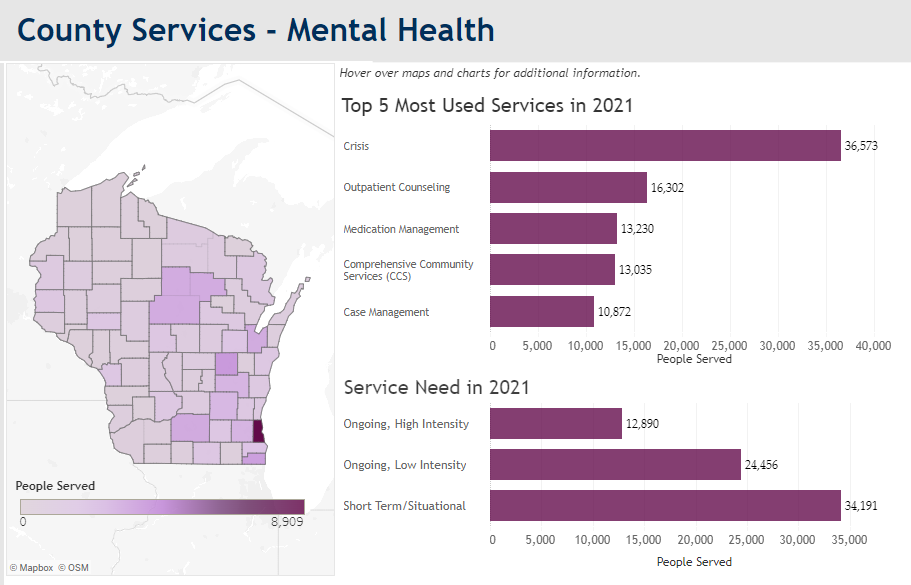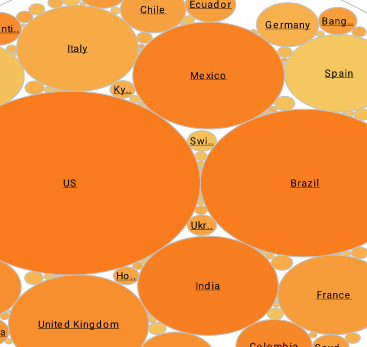Key Performance Indicators For Mental Health Services
The use of key performance indicators (KPIs) is crucial for assessing the effectiveness of mental health care. They provide a quantitative and unbiased tool to monitor development and identify potential areas for growth.
KPI measurement may assist mental health providers maximize revenue, optimize resource use, and enhance patient outcomes. Key performance metrics for mental health care will be covered in this article.
Patient Engagement
Patient involvement is a critical KPI for mental health treatment. Patient engagement is the degree to which people are involved and take part in their medical care. Engaged patients are more likely to adhere to treatment regimens, produce greater results, and report higher levels of satisfaction.
In order to evaluate the success of their treatment strategies, mental health providers must monitor patient participation.
| #1 Ranking: Read how InetSoft was rated #1 for user adoption in G2's user survey-based index | Read More |
There are several methods for assessing patient participation. One method is to gauge how often people attend treatment sessions. Monitoring the number of patients who attend support groups or group treatment sessions is another method. Patient surveys are another tool that mental health providers may use to gauge patient participation.
Treatment Effectiveness
Treatment efficacy is another key KPI for mental health treatments. How successfully mental health services accomplish their therapeutic objectives is measured by treatment effectiveness. To evaluate the efficiency of their treatment programs and make necessary modifications, mental health services must measure treatment effectiveness.
Patient surveys, treatment outcome measures, and chart audits are just a few of the techniques that mental health professionals might employ to gauge how successful their treatments are. Measures of the effectiveness of the therapy evaluate how well patients are responding to the treatment. Standardized outcome measures, such the PHQ-9 or GAD-7, may be used by mental health professionals to monitor patient improvement.
Staff Productivity
Since it gauges how effectively employees are working, staff productivity is a crucial KPI for mental health services. To enhance patient outcomes and boost income, mental health services must maximize employee productivity. Mental health providers may identify areas for development and implement adjustments to increase productivity by tracking worker productivity.
The number of patients seen each day, the number of patient calls returned, and the typical time it takes to complete paperwork are just a few methods to gauge staff productivity. Software solutions may be used by mental health providers to automatically measure employee productivity.
Patient Safety
Another crucial KPI for mental health treatment is patient safety. The degree to which mental health services protect the safety of their patients is measured by patient safety. To prevent negative outcomes and preserve their image, mental health providers must put patient safety first.
Incident reports, patient complaints, and chart audits are just a few of the many methods to gauge patient safety. Incident reports may be used by mental health providers to keep track of the frequency and nature of episodes. Insight into potential areas for development may also be gained from patient complaints. Mental health services might use chart audits to find any holes in their operations.
Financial Performance
A key KPI for mental health care is financial performance. The profitability of mental health services is assessed by financial performance, which also guarantees their long-term survival. To invest in their facilities, technology, and employees, mental health services must maximize their financial success.
Financial success may be measured in a number of ways, including sales, net income, and profit margins. In order to find areas where money may be saved, mental health services might also keep track of their costs. Mental health services may improve patient care and carry out their goal by maximizing their financial performance.
 |
Learn about the top 10 features of embedded business intelligence. |
Care Quality
Another crucial KPI for mental health treatment is care quality. The standard of care assesses how well patients are treated by mental health services. To enhance patient outcomes and adhere to regulatory standards, mental health services must emphasize quality of treatment.
Patient surveys, chart audits, and assessments of regulatory compliance are just a few of the methods available to gauge the quality of care provided. Patient surveys may assist mental health services in identifying areas for improvement from the patient's viewpoint. Any holes in the care processes and procedures may be found via chart audits.
Revenue per Patient
A critical KPI to track for mental health services is revenue per patient. This measure informs you of the revenue generated by each patient. Divide your total revenue by the total number of patients seen over a certain time period to arrive at this figure. This will give you an indication of how much money each patient is making.
By monitoring this KPI, you may spot income patterns and gauge how well your services are being accepted. You may also find ways to boost income by expanding the number of patients you visit or by making your treatment plans more successful.
 |
Learn the advantages of InetSoft's small footprint BI platform. |
Acceptance Rate for Insurance
Insurance reimbursements are a common source of funding for mental health treatments. As a result, it is crucial to assess your insurance acceptance rate. This measure reveals the proportion of patients with insurance coverage and those who must pay out-of-pocket.
You may find possibilities to grow your insurance network and increase your income by monitoring this KPI. You may also recognize patients who might want financial support and create initiatives to assist them.
Cost of Therapy on Average
The amount of money a patient spends on their mental health therapy is known as the average treatment cost. This KPI takes into account all treatment-related expenses, such as those for therapy sessions, medications, and other services.
You may spot patterns in treatment cost trends and create cost-cutting initiatives by monitoring this KPI. This statistic may also be used to evaluate the efficacy of your treatment plans and identify which ones are most beneficial to patients.
 |
Learn how InetSoft's data intelligence technology is central to delivering efficient business intelligence. |
Patient Retention Rate
Your patient retention rate is a gauge of how well you are keeping customers. This KPI calculates the proportion of clients who utilize your mental health services on an ongoing basis. Divide the total number of patients seen during a certain time period by the number of patients who continue to utilize your services to arrive at this measure.
You can see patterns in patient retention and create plans to increase it by monitoring this KPI. Also, you may recognize patients who could stop using your services and create initiatives to keep them interested.
Appointment No-Show Rate
How successfully you manage your appointments is determined by your appointment no-show rate. This KPI tracks the proportion of patients that miss their planned appointments. Divide the total number of planned appointments by the number of missed appointments to arrive at this measure.

